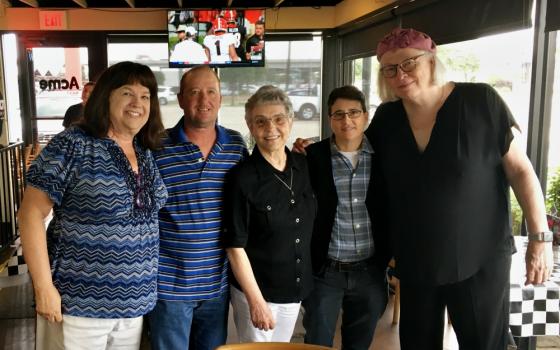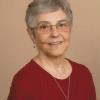As my friend and I were enjoying our meal and conversation in a restaurant, I was aware of a man at another table staring at us. Finally, I turned to him and stared back. He quickly and sheepishly turned away. I knew why he was staring. My friend was a transgender woman.
What we see depends a lot on how we look. Jesus showed us how important it is to see people with our heart. Where the crowd saw a cheating tax collector looking ridiculous in a tree, Jesus saw a man seeking something more for his life. Where the Pharisees saw a sinful woman touching him, Jesus saw a woman expressing great love.
Though we are experiencing emboldened expressions of prejudice and hate in our country, a good thing emerging is a growing plea to see people for who they are, to treat them with dignity and respect.
For 19 years, I have had the joy of ministering to about 250 transgender people across the country. Many have never been Catholic; many are no longer Catholic; some are of other Christian denominations, Jewish or "nones."
I have spent thousands of hours with them. In my 57 years as a woman religious, no ministry has so profoundly shaped my life in God as being a faith companion to God's transgender people.
Some people see them as sinful and condemned by God. Others see them as sexual predators in women's bathrooms. And yet others see them as psychologically disturbed and not really transgender at all.
I am compelled to give witness to how I have seen them for almost two decades. They aren't perfect of course. No one is. But I have learned much from them.
I see them as courageous people of integrity. Many of us choose to live a lie in some arenas of life. We stay in a job we hate. We profess to believe what we don't really believe. But pretending comes with much higher stakes for transgender people because the issue is about who they are.
In the fidelity of prayer and the hard work of self-knowledge, they have come to know that they can no longer pretend to be someone they are not. So at the risk of losing families, friends, careers and faith communities, they claim their truth openly.
Sara Davis Buechner is once again a successful concert pianist after losing her career when she transitioned in the 1990s. In part, she knew she had to transition because her playing was increasingly becoming separate from the self within her from which the music flowed.
I see them as wisdom people. Suffering for the sake of living in the truth is often where wisdom is born. Many of them have gone from fear to courage, self-doubt to self-confidence, isolation to care and compassion for others. They have learned the wisdom that comes with letting go of what they cannot control. They are more at peace and content with far less, for they now possess what is most precious — their integrity.
Gwen lost so much when she could no longer deny the truth of who she was. She went from a beautiful, two-story brick home in a gated community with a three-car garage and swimming pool to a small rental apartment. She now experiences a greater measure of freedom and peace that comes with less attachment to material possessions.
I see them as being faithful to God. Most transgender people who reached out to me did so because they wanted to be faithful to God. It has been a gift to witness the healing of their spirit in gradual, deepening self-knowledge and inner freedom that blossoms into greater love of God, others and themselves.
Chris made a couple of directed retreats with me during the years I walked with him. Always his greatest desire was to be at one with God. The more he embraced his own goodness, the more he opened himself to God's love.
A few years ago, I experienced a performance by the staff and residents of a homeless shelter. At the end of the performance, a few of the residents each in turn came forward and declared, "Don't call me homeless. I don't call you homed." And "Don't call me homeless. I have a master's degree in environmental engineering."
It was a poignant and powerful way to challenge how we see people who are homeless. I wished I could give a voice to my transgender community this way so others could see them as I see them. So I invited them to write their own reflection on being seen.
Don't call me a sinner. I have served at our liturgy as an usher, and was a member of the parish school board. I have taught CCD and I have chaperoned many youth events. And I am your good neighbor.
—Tonya
___
Call me Sean. That has been my name since I was 6 years old. But no one knew that except God and me. I'm not a deviant or God's mistake. I am a levelheaded, good-hearted, loving transgender man whom God loves unconditionally. God knew me before I was born, and knows me now, a simple man named Sean.
—Sean
___
Don't call me tranny. I am transgender. That does not make me inferior. I am more than transgender and I am more than the belittled freak your tone conveys. Don't call me nigger. I am not the history of hate, racism and cowardice that gave birth to that word. Don't call me at all if it is not with respect for who I am.
—Ash
___
Well, simply ... don't call me. My once beloved friend, please, don't call me. I asked you, "Don't call me David, please call me Sara." But you could not. God led me through that difficult journey into my own truth without once letting go of my hand. But you, my friend, you vanished.
—Sara
___
Please call me Maxx and understand I don't fit into a gender box. Please ask me what pronouns I prefer and you will make me very happy. But don't expect me to always explain to you what gender I am, and what it means to be trans. While I like educating people about gender, I need a break from the constant stress. I want to enter a public restroom without fear and I want to walk through the world with the same respect others take for granted. Please see me for who I am.
—Maxx
___
Don't call me an anomaly. People who take it upon themselves to speak for God and damn us call us anomalies. There are so many pressures to conform to the wishes of those who do not or will not understand us. To survive, we must live openly as who we are. We are brothers, sisters, aunts, uncles, parents and grandparents. We are spiritual and can't imagine a God who would wish for us to remain invisible just so others can feel more comfortable. Don't call me an anomaly.
—Libby
___
Call me a leader. I medically transitioned in the mid-1990s, before most people knew that trans folks exist. With my professional presence, I forced the corporate world to reevaluate their prejudices. I've mentored other trans folks inside and outside of my company. I've spent two decades volunteering with teenagers, teaching them and helping them grow into adults of good character. I've made a positive difference in the world by enabling others to be their best selves, and to bring that person everywhere they go.
—Scotty
Our former Dominican master general, Timothy Radcliffe, talked to my community in 2011 about "Creating an Environment of Nonviolence." He said that to really see people is a way to practice nonviolence. There would be incredibly less violence in the world if we could see each other as God sees us, before making any judgment. This is the passionate desire of Pope Francis; he repeatedly invites us into a culture of encounter.
Several years ago, I was asked by a national Catholic organization to present a session at their yearly conference on ministering among transgender people. Transgender people speak eloquently for themselves, so I asked a Catholic transwoman to share the session with me because she was articulate and deeply faithful to God and the Catholic Church.
As we ended the session, one of the priests stood, walked over to her, then knelt in front of her and asked her to bless him. Neither of us was remotely prepared for that kind of response.
After a moment of silence, my friend placed her hands on his shoulders and prayed. It was an unexpected powerful experience of God's gracious and healing presence — for the priest, for her, and for all of us present.
It was the grace of being seen for who she was. It was the grace of being seen as God sees her. May we all learn to see each other as God sees!
[Luisa Derouen, a member of the Dominican Sisters of Peace, began to minister among the transgender community in 1999 and has been a spiritual companion formally and informally to about 250 transgender people across the country. She is now semiretired at the St. Catharine Motherhouse in central Kentucky.]

